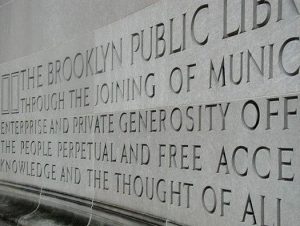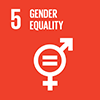
Inscription at Brooklyn Public Library, New York (Photo BPL)
On the World Day of Social Justice, it is a good moment to celebrate libraries as social justice institutions. Places where the power that information and knowledge can bring is available for all.
The core functions of libraries are already reflected in the right of access to information, and the right to participate in the cultural life of the community, both of which appear in the Universal Declaration of Human Rights. These rights are included as part of an overall framework that seeks to promote free, just and peaceful societies.
For the lucky, access to information and culture may not seem like a challenge. They can afford the books they and their family want to read. They have benefitted from a high-quality education, and work for companies that invest in their skills. They were early-adopters of digital technology, and have the latest gadgets and the free time to learn to use them. They are confident in speaking out, and expect to be heard.

Logo for SDG5: Gender Equality. Women are too often on the wrong side of the information divide.
But the ‘lucky’ are only a part – perhaps a small part – of the whole. For others, access is not a reality. They cannot afford books, Internet connections, or subscriptions, or cannot find materials that are relevant for them. For some types of information – such as scientific journals – only a tiny proportion of individuals can realistically expect to be able to buy all that they might need.
The skills to make this access meaningful are also important. Yet it is often those who struggle with the costs of information that also lack the knowledge or confidence needed to apply it. This holds them back from taking better decisions and improving their lives. Many of these themes are covered in the 2017 Development and Access to Information report, produced by IFLA in partnership with the Technology and Social Change Group at the University of Washington.
Libraries offer a solution. As a long-standing form of the sharing economy, they ensure that one book can have many different readers. They are welcoming spaces, where all can come and learn and train. They are professionally bound in many cases to ensuring that all members of their community benefit from their services (including the migrant workers who are a key focus of this year’s Social Justice Day – see these guidelines from IFLA’s Section for Libraries serving Multicultural Populations). They do not means-test in general, ensuring that those who need them most are not stigmatised.
Even in the richest societies, libraries have a strong role as a core public service, providing access and support to those who need it. Many of those they help will turn into book-buyers in future, thanks to the education and encouragement they have received. Some may not, but it remains a duty of government to fulfil their rights too.
This is why the mission of libraries – to provide meaningful, universal access to information – is a social justice mission. And why on World Social Justice Day 2018, it is a chance to celebrate what they do.
It is in reality a nice and helpful piece of information. I’m glad that you just shared this
useful info with us. Please stay us informed like this. Thanks for
sharing.
Pingback: New IFLA: Social Justice: a Core Library Mission – Stephen's Lighthouse